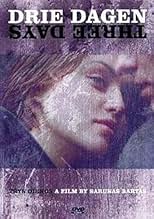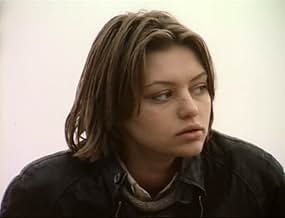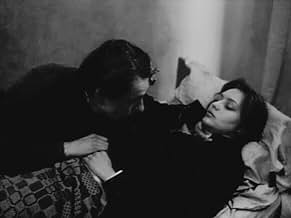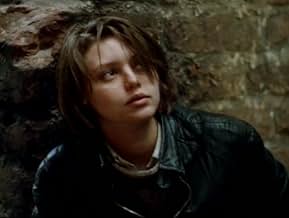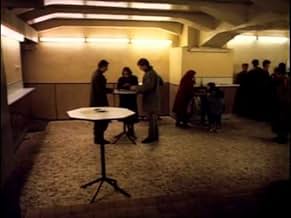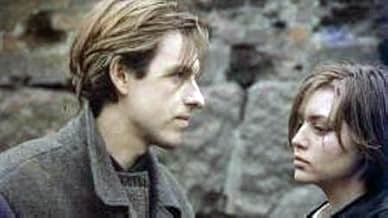Füge eine Handlung in deiner Sprache hinzuThe wanderings of two young couples who form in the city of Kaliningrad.The wanderings of two young couples who form in the city of Kaliningrad.The wanderings of two young couples who form in the city of Kaliningrad.
- Regie
- Drehbuch
- Hauptbesetzung
- Auszeichnungen
- 3 Gewinne & 2 Nominierungen insgesamt
Empfohlene Bewertungen
Four sensitive and handsome youngsters, two Lithuanians boys and two Russians girls mooch in Kaliningrad for three days, limpets who end up not failing to cling to the rock. There's hardly any dialogue or plot to speak of. The director leaves you a lot of room to put your own version on events, for me he therefore makes it a universal story about delicate young people who are sad about the impossibility of living authentically. I'll share with you a story, for which I crave your indulgence. At a recent Christmas play, where Peter Pan was being performed, a young boy plaintively called out at the end, "I love you Captain Hook". Adults discussing this took it as evidence of some sort of aberrance. But what is Captain Hook, other than a try-hard who has been maimed by a crocodile that haunts him, and who nobody loves? There's a sensitivity in youth that the world cannot tolerate.
I cannot offhand think of a movie in terms of visual aesthetic that is more beautiful than Three Days. It's a film you have to give yourself up to, as if you're an oracle allowing a god to channel their voice through you. I chose to put in on the evening before Christmas Eve, a night I have to myself, where I can relax, before having to go see people on Christmas Day. It's predominantly a shades of brown movie, though ghostly white gets in there all the time (even grisaille), and blue here and there. The locations are all ruins that vary in level of decrepitude. The youngsters end up existing out of residences that are cave like and primal. At one point they are scattered in the ruins of a church, and it's as if pigeons had been scattered, a quite unbelievable scene.
As sad as these youths are, something more beautiful is happening for them than anything that has ever happened in my life. Sometimes it is better to cry than to live in the world, I certainly regret not having cried more in my life.
There is a juxtaposition throughout the movie between the four youths, and people who are yahooing or fornicating. Not everyone goes through the metanoia described in this movie! This is one to keep on watching over and again.
I cannot offhand think of a movie in terms of visual aesthetic that is more beautiful than Three Days. It's a film you have to give yourself up to, as if you're an oracle allowing a god to channel their voice through you. I chose to put in on the evening before Christmas Eve, a night I have to myself, where I can relax, before having to go see people on Christmas Day. It's predominantly a shades of brown movie, though ghostly white gets in there all the time (even grisaille), and blue here and there. The locations are all ruins that vary in level of decrepitude. The youngsters end up existing out of residences that are cave like and primal. At one point they are scattered in the ruins of a church, and it's as if pigeons had been scattered, a quite unbelievable scene.
As sad as these youths are, something more beautiful is happening for them than anything that has ever happened in my life. Sometimes it is better to cry than to live in the world, I certainly regret not having cried more in my life.
There is a juxtaposition throughout the movie between the four youths, and people who are yahooing or fornicating. Not everyone goes through the metanoia described in this movie! This is one to keep on watching over and again.
"Trys dienos" (Three days) was released in 1991. It was the time of the collapse of the Soviet Union. The time when the Baltic Republics were once again independent for the first time since the Second World War.
The film is situated in Kaliningrad, the former Prussian city of Koningsberg, the city of the famous philosopher Immanuel Kant. Today the city is Russian territory, but seperated from the Russian mainland. It is enclosed by Lithuania, Poland and Belarus. Given this geography it is the ideal location to symbolize the confusion of the immediate post Soviet era.
The film is about two boys and two girls aimlessly wandering through the city for three days. The "story" has a clear resemblance with "Menschen am Sonntag" (1931, Robert Siodmak & Edgar Ulmer & Rochus Gliese) but is distinctly inferior in quality. I paid a lot of attention to the era in which the film is situated, because only with this in mind the film can be interpreted and (somewhat) appreciated.
Other films about the era after the implosion of the Soviet Union are: "Darkness in Tallin" (1993, Ilkka Järvi Laturi).
"In that land" (1998, Lidiya Bobrova).
Moreover to really understand a film such as "Lilya 4-ever" (2002, Lukas Moodysson) is is also necessary to understand the situation just after the Soviet Union has fallen apart.
In an earlier version of this review I wrote that the film has not aged well. Today (november 2024) I think the film is highly topical in helping to understand Poetin's Russia. The collapse from superpower to nearly developing country in a very short time has given the pride of the Russians a huge blow.
The film is situated in Kaliningrad, the former Prussian city of Koningsberg, the city of the famous philosopher Immanuel Kant. Today the city is Russian territory, but seperated from the Russian mainland. It is enclosed by Lithuania, Poland and Belarus. Given this geography it is the ideal location to symbolize the confusion of the immediate post Soviet era.
The film is about two boys and two girls aimlessly wandering through the city for three days. The "story" has a clear resemblance with "Menschen am Sonntag" (1931, Robert Siodmak & Edgar Ulmer & Rochus Gliese) but is distinctly inferior in quality. I paid a lot of attention to the era in which the film is situated, because only with this in mind the film can be interpreted and (somewhat) appreciated.
Other films about the era after the implosion of the Soviet Union are: "Darkness in Tallin" (1993, Ilkka Järvi Laturi).
"In that land" (1998, Lidiya Bobrova).
Moreover to really understand a film such as "Lilya 4-ever" (2002, Lukas Moodysson) is is also necessary to understand the situation just after the Soviet Union has fallen apart.
In an earlier version of this review I wrote that the film has not aged well. Today (november 2024) I think the film is highly topical in helping to understand Poetin's Russia. The collapse from superpower to nearly developing country in a very short time has given the pride of the Russians a huge blow.
I watched this movie, but never had a clue what it was about. Really it was a load of boring moments. A really funny moment was when the credits appeared, cause no one expected that at that moment. Really I would not waste your time to watch this movie.
Tonight I saw this strange but beautiful picture. It's a mere registration of the live of some lonely people as it is a movie with a clear story. THough the pictures of Kalinigrad of the early nineties and the breakdown of communism are always giving me mixed feelings, this movie left me with one question: what have I been watching??
Up to 1945 the Russian city of Kaliningrad used to be the German 'Königsberg'. Due to Adolf Hitler's lost war the town was transferred to Stalin's Soviet Union.
Kaliningrad makes the location of 'Trys dienos' (= Lituvanian for 'three days'). Director Bartas cleverly used its surviving massive German architecture as a setting for his very East European story. Thus making a special contrast.
The desolation of his plot also reflects the desolation of Kaliningrad: the town is Russian, but does not look Russian. The town is Russian, but cannot escape its German past. Its inhabitants tend to look westwards to Scandinavia, but are tied up eastwards to Moscow.
These ingredients make 'Trys dienos' attractive. Its picturing is adequate, its story & acting are no more than mediocre.
Kaliningrad makes the location of 'Trys dienos' (= Lituvanian for 'three days'). Director Bartas cleverly used its surviving massive German architecture as a setting for his very East European story. Thus making a special contrast.
The desolation of his plot also reflects the desolation of Kaliningrad: the town is Russian, but does not look Russian. The town is Russian, but cannot escape its German past. Its inhabitants tend to look westwards to Scandinavia, but are tied up eastwards to Moscow.
These ingredients make 'Trys dienos' attractive. Its picturing is adequate, its story & acting are no more than mediocre.
Wusstest du schon
- VerbindungenEdited into Geschichte(n) des Kinos: Le contrôle de l'univers (1999)
- SoundtracksLambada
Performed by 'Kaoma'
Top-Auswahl
Melde dich zum Bewerten an und greife auf die Watchlist für personalisierte Empfehlungen zu.
Details
Zu dieser Seite beitragen
Bearbeitung vorschlagen oder fehlenden Inhalt hinzufügen

